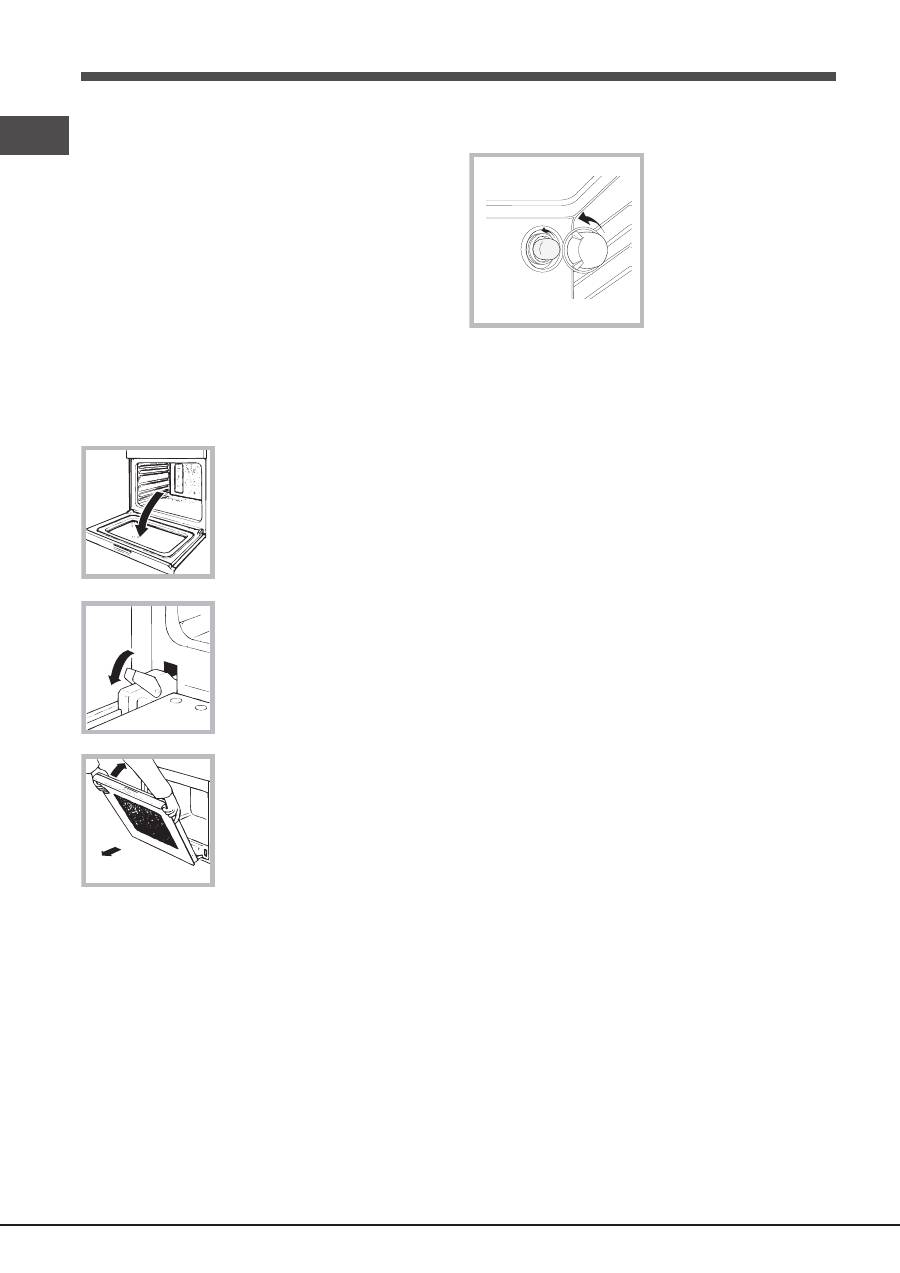Indesit FGIM-K-IX-S: Precautions and tips
Precautions and tips: Indesit FGIM-K-IX-S

GB
25
Precautions and tips
!
This appliance has been designed and manufactured
in compliance with international safety standards. The
following warnings are provided for safety reasons and
must be read carefully.
General safety
•
This is a class 3 built-in appliance.
•
Gas appliances require regular air exchange to
maintain efficient operation. When installing the
cooker, follow the instructions provided in the
paragraph on “Positioning” the appliance.
• The appliance was designed for domestic use inside the
home and is not intended for commercial or industrial
use.
• The appliance must not be installed outdoors, even in
covered areas. It is extremely dangerous to leave the
appliance exposed to rain and storms.
• When moving or positioning the appliance, always use
the handles provided on the sides of the oven.
• Do not touch the appliance while barefoot or with wet or
damp hands and feet.
•
The appliance must be used by adults only for
the preparation of food, in accordance with the
instructions provided in this booklet. Any other
use of the appliance (e.g. for heating the room)
constitutes improper use and is dangerous. The
manufacturer may not be held responsible for any
damage caused as a result of improper, incorrect
and unreasonable use of the appliance.
•
Do not touch the heating elements or certain parts
of the oven door when the appliance is in use; these
parts become extremely hot. Keep children well away
from the appliance.
• Make sure that the power supply cables of other electrical
appliances do not come into contact with the hot parts of
the oven.
• The ventilation and heat dispersal openings must never
be obstructed.
• Always grip the oven door handle in the centre: the ends
may be hot.
• Always use oven gloves when placing cookware in the
oven or when removing it.
• Do not use aluminium foil to line the bottom of the oven.
• Do not place flammable materials in the oven: if the
appliance is switched on accidentally, the materials could
catch fire.
• Always make sure the knobs are in the “●”/“
○
” position
when the appliance is not in use.
• When unplugging the appliance, always pull the plug
from the mains socket; do not pull on the cable.
• Do not perform any cleaning or maintenance work without
having disconnected the appliance from the electricity
mains.
• If the event of malfunctions, under no circumstances
should you attempt to perform the repairs yourself.
Contact an authorised Service Centre (see Assistance).
• Do not rest objects on the open oven door.
• Do not let children play with the appliance.
• The appliance should not be operated by people
(including children) with reduced physical, sensory or
mental capacities, by inexperienced individuals or by
anyone who is not familiar with the product. These
individuals should, at the very least, be supervised by
someone who assumes responsibility for their safety or
receive preliminary instructions relating to the operation
of the appliance.
• The appliance is not intended to be operated by
means of an external timer or separate remote-
control system.
Disposal
• When disposing of packaging material: observe local
legislation so that the packaging may be reused.
• The European Directive 2012/19/EC on Waste
Electrical and Electronic Equipment (WEEE), requires
that old household electrical appliances must not
be disposed of in the normal unsorted municipal
waste stream. Old appliances must be collected
separately in order to optimise the recovery and
recycling of the materials they contain and reduce
the impact on human health and the environment.
The crossed out “wheeled bin” symbol on the product
reminds you of your obligation, that when you dispose
of the appliance it must be separately collected.
Consumers should contact their local authority or retailer
for information concerning the correct disposal of their
old appliance.
Respecting and conserving the
environment
• You can help to reduce the peak load of the electricity
supply network companies by using the oven in the
hours between late afternoon and the early hours of
the morning. The cooking mode programming options,
the “delayed cooking” mode (see Cooking modes) and
“delayed automatic cleaning” mode (see Care and
Maintenance) in particular, enable the user to organise
their time efficiently.
• Always keep the oven door closed when using the GRILL
modes: This will achieve improved results while saving
energy (approximately 10%).
• Regularly check the door seals and wipe clean to ensure
they are free of debris so that they stick properly to the
door and do not allow heat to disperse.
Maintenance and care
Switching the appliance off
Disconnect your appliance from the electricity supply before
carrying out any work on it.
Cleaning the appliance
• The stainless steel or enamel-coated external parts and
the rubber seals may be cleaned using a sponge that
has been soaked in lukewarm water and neutral soap.
Use specialised products for the removal of stubborn
stains. After cleaning, rinse and dry thoroughly. Do not
use abrasive powders or corrosive substances.

26
GB
• The inside of the oven should ideally be cleaned after
each use, while it is still lukewarm. Use hot water and
detergent, then rinse well and dry with a soft cloth. Do
not use abrasive products.
• All accessories - with the exception of the sliding racks
- can be washed like everyday crockery, and are even
dishwasher safe.
!
Never use steam cleaners or pressure cleaners on the
appliance.
Cleaning the oven door
Clean the glass part of the oven door using a sponge and
a non-abrasive cleaning product, then dry thoroughly with a
soft cloth. Do not use rough abrasive material or sharp metal
scrapers as these could scratch the surface and cause the
glass to crack. For more thorough cleaning purposes, the
oven door may be removed:
1. Open the oven door fully (see
diagram);
2. Lift up and turn the small levers
located on the two hinges (see
diagram);
3. Grip the door on the two external
sides and close it approximately
half way. Pull the door towards you,
lifting it out of its slot (see diagram).
To replace the door, reverse this sequence.
Inspecting the seals
Check the door seals around the oven regularly. If the seals
are damaged, please contact your nearest Service Centre
(see Assistance). We recommend that the oven is not used
until the seals have been replaced.
Replacing the light bulb
To replace the oven light
bulb:
1. Remove the glass cover
of the lamp-holder.
2. Remove the light bulb
and replace it with a similar
one: Wattage 25 W, cap E
14.
3. Replace the glass cover
(
see diagram
).
!
Do not use the oven lamp as/for ambient lighting
Оглавление
- Довідник користувача
- Avvertenze
- Advertencias
- Предупреждения
- Assistenza
- Assistência
- Descrizione dell’apparecchio
- Описание изделия
- Descrizione dell’apparecchio
- Installazione
- Avvio e utilizzo
- Programmi
- Precauzioni e consigli
- Installation
- Start-up and use
- Cooking modes
- Precautions and tips
- Instalación
- Puesta en funcionamiento y uso
- Programas
- Precauciones y consejos
- Instalação
- Início e utilização
- Programas
- Precauções e conselhos
- Установка
- Включение и эксплуатация
- Программы
- Предосторожности и рекомендации
- Техническое обслуживание и уход
- Установлення
- Запуск і використання
- Програми
- Запобіжні заходи та поради

